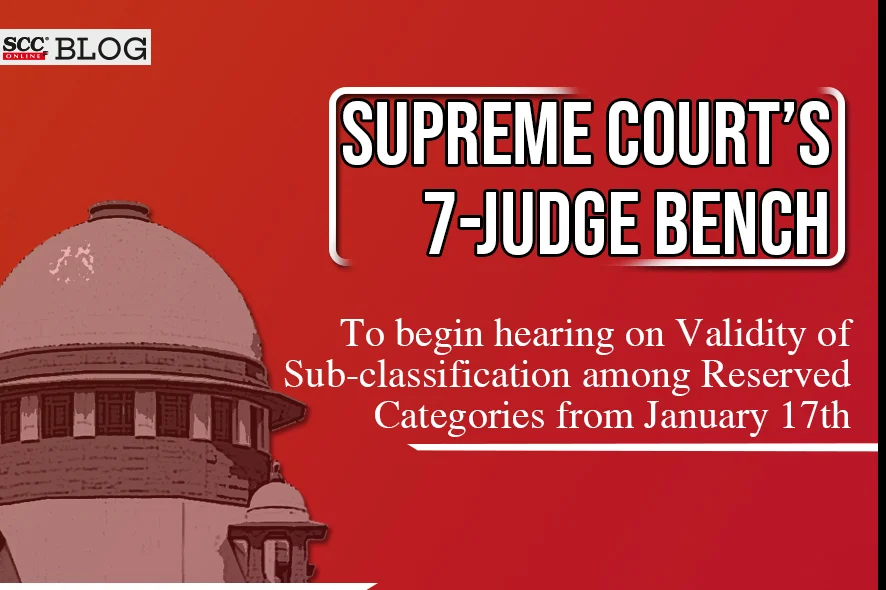Supreme Court: The 7-Judge Constitution bench comprising of Dr. DY Chandrachud, CJI, Sanjiv Khanna, Vikram Nath, JB Pardiwala, Dipankar Datta, Manoj Misra, Satish Chandra Sharma, JJ. will commence the hearing of the matter regarding validity of sub-classification among reserved categories from 17-01-2024.
In 1975, the Punjab Government issued a notification dividing its existing 25% reservation for Scheduled Castes (‘SC’) into two categories. Half of these seats were reserved for the SC category were to be offered to Balmikis and Mazhabi Sikhs. The other half of the reserved seats was for the remaining groups within the SC category. This notification continued to remain in effect for 31 years, until the Supreme Court’s five-judge bench decision in E.V. Chinnaiah v. State of A.P., (2005) 1 SCC 394 set aside a similar law in Andhra Pradesh.
The 5-Judge Bench in EV Chinnaiah (supra) had held that the Scheduled Castes form homogenous classes and there cannot be any sub-division. Further, the Bench said that the principles laid down in Indra Sawhney v. Union of India, 1992 Supp (3) SCC 217 , for subclassification of Other Backward Classes can be applied as a precedent law for subclassification or subgrouping Scheduled Castes in the Presidential List because that very judgment itself has specifically held that subdivision of OBCs is not applicable to Scheduled Caste and Scheduled Tribes. Thus, the Constitution itself has kept the Scheduled Castes and Scheduled Tribes List out of interference by the State Governments.
Since the said decision ruled that sub-classification within the SC category was not permitted, the Punjab and Haryana High Court struck down the notification on 25-07-2006.
Thereafter, the Punjab Government passed the Punjab Scheduled Caste and Backward Classes (Reservation in Services) Act, 2006 (‘Act, 2006’), which reintroduced ‘first preference’ reservation for the Balmikis and Mazhabi Sikhs, and half of the total seats reserved for the SC category would be offered first to these two communities before all other SC groups. On 29-03-2010, the Punjab and Haryana High Court struck down this provision of the Act based on the decision in EV Chinnaiah, leading to a subsequent appeal to the Supreme Court.
In 2014, the 3-Judge Bench hearing the appeal referred the matter to a 5-Judge Constitution Bench to assess the correctness of E.V. Chinnaiah. After noticing that a 5-Judge Bench decision in E.V. Chinnaiah is required to be revisited, the 5-judge bench of Arun Mishra, Indira Banerjee, Vineet Saran, MR Shah and Aniruddha Bose, JJ has referred the matter to a 7-Judge Bench, while observing that “reservation was not contemplated for all the time by the framers of the Constitution. On the one hand, there is no exclusion of those who have come up, on the other hand, if sub¬classification is denied, it would defeat right to equality by treating unequal as equal”.
Issues:
-
Can sub-classification be permitted for the Scheduled Caste and Scheduled Tribe categories, since the same is permitted for the SEBC category?
-
Are state legislatures competent to introduce sub-classification within the Scheduled Caste and Scheduled Tribe categories?
The 7-Judge Bench will commence the hearing from 17-01-2024.
Also read:
[State of Punjab v Davinder Singh, C.A No. 2317/2011 ETC]







